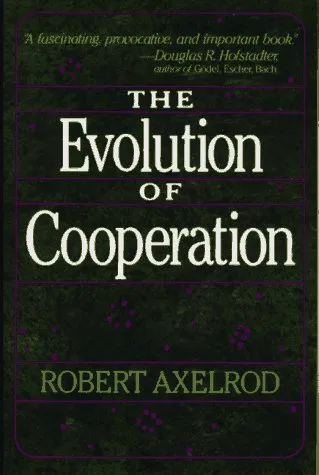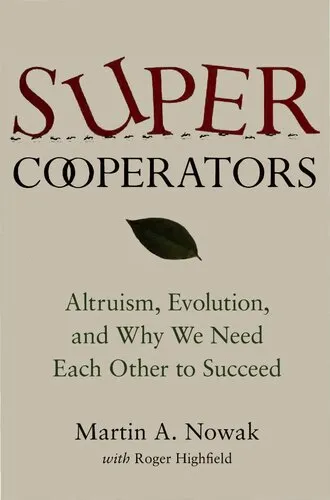The Evolution of Cooperation
4.5
Reviews from our users

You Can Ask your questions from this book's AI after Login
Each download or ask from book AI costs 2 points. To earn more free points, please visit the Points Guide Page and complete some valuable actions.Related Refrences:
Welcome to a deeper understanding of cooperation, conflict, and the strategic interactions that shape human behavior and society. In "The Evolution of Cooperation," Robert Axelrod explores the fascinating dynamics of collaboration, even in environments where competition initially seems inevitable. Through the lens of game theory and the famous "Prisoner's Dilemma," this intellectual journey provides actionable insights into how cooperation might emerge and thrive in complex systems.
Detailed Summary of the Book
"The Evolution of Cooperation" delves into a fundamental question: how can cooperation emerge in a world where individuals act in their own self-interest? By focusing on the Prisoner's Dilemma—an iconic model in game theory—Axelrod provides a framework to study strategies for cooperation in a competitive environment. The book illustrates that under the right conditions, cooperation is not only possible but can sustain itself over time, even in scenarios where distrust runs high.
Axelrod organizes the book around experiments and simulations of repeated interactions, showing how a simple strategy called "Tit for Tat" became incredibly successful. This strategy, which involves cooperating on the first move and then replicating the previous action of the opponent in subsequent rounds, exemplifies how mutual cooperation can outcompete selfish behavior in the long term. The findings from Axelrod's research challenge conventional wisdom and offer compelling evidence that trust and reciprocity can triumph, even in environments characterized by competition.
Beyond the game-theory framework, Axelrod's work has broad implications in disciplines ranging from biology and political science to sociology and economics. From evolutionary biology to international diplomacy, the principles of sustained cooperation revealed in this book illuminate real-world scenarios where understanding cooperative dynamics is critical.
Key Takeaways
- **Cooperation can thrive even in competitive environments**: Repeated interactions and mutual reciprocity lay the foundation for trust and collaborative behavior.
- **Tit for Tat as an optimal strategy**: A simple, forgiving, and retaliatory strategy can promote long-term cooperation effectively.
- **The importance of communication**: Successful cooperation often depends on the ability to exchange signals and intentions within a system.
- **Evolutionary applications**: Cooperation’s survival isn't limited to human interactions—it appears in biological and ecological systems, shedding light on evolutionary processes.
- **Stability through repetition**: Repeated interactions and the shadow of the future transform short-term competition into long-term collaboration.
Famous Quotes from the Book
"The foundation of cooperation is not really trust, but the durability of the relationship."
"In a world where the individuals are striving for their own survival and reproduction, cooperation can nevertheless emerge."
"The key to doing well lies not in overcoming others, but in eliciting their cooperation."
Why This Book Matters
"The Evolution of Cooperation" matters because it provides a blueprint for understanding the mechanisms behind successful collaboration, even in seemingly antagonistic circumstances. In a world increasingly marked by division and distrust, the lessons in this book are more relevant than ever. Axelrod's rigorous experiments with the Prisoner's Dilemma bring hope that cooperation is not only possible but can emerge naturally under certain conditions.
The interdisciplinary implications of the book make it a treasure trove for academics, policymakers, economists, and anyone interested in addressing conflicts productively. Whether applied to business negotiations, international peacekeeping efforts, or personal relationships, the insights presented in "The Evolution of Cooperation" provide both the theoretical basis and practical tools for fostering collaboration. By understanding the dynamics Axelrod describes, we gain the ability to create systems where honest, reciprocal, and sustainable interactions flourish.
This book has stood the test of time as a definitive guide to understanding not only why cooperation matters but also how it works—and how it can be cultivated in a wide range of contexts.
Free Direct Download
You Can Download this book after Login
Accessing books through legal platforms and public libraries not only supports the rights of authors and publishers but also contributes to the sustainability of reading culture. Before downloading, please take a moment to consider these options.
Find this book on other platforms:
WorldCat helps you find books in libraries worldwide.
See ratings, reviews, and discussions on Goodreads.
Find and buy rare or used books on AbeBooks.
1271
بازدید4.5
امتیاز50
نظر98%
رضایتReviews:
4.5
Based on 0 users review
"کیفیت چاپ عالی بود، خیلی راضیام"






